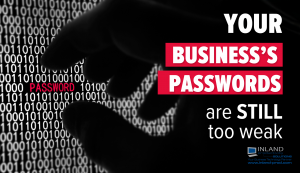Let’s be honest—does your organization still rely on passwords like “12345” or “password123”? If so, you're not alone. But that doesn’t make it acceptable.
Despite years of guidance from cybersecurity professionals, weak passwords remain alarmingly common. This poses a serious threat, as they are among the easiest entry points for cybercriminals targeting business systems.
Recent studies reveal that the most frequently used business password is still “123456,” followed closely by “123456789,” “password,” and “qwerty123.” These aren’t just careless choices—they’re open invitations to attackers.
And it’s not just large enterprises making these mistakes. Small and medium-sized businesses (SMBs) are equally vulnerable, often with fewer resources to recover from a breach. A single compromised password can expose email accounts, financial systems, sensitive files, and customer data—leading to significant financial and reputational damage.
You might think, “We’re too small to be a target.” But every organization holds valuable data. Cybercriminals don’t discriminate—they seek easy wins, and weak passwords are the easiest win of all.
Even if you’ve moved beyond “123456,” your passwords may still be insecure. Using personal information like your name or email address—or sentimental phrases like “iloveyou”—can be just as risky.
What Can You Do?
- Enforce Strong, Unique Passwords
Encourage the use of long, randomly generated passwords that include a mix of letters, numbers, and symbols. Avoid anything predictable. - Use a Password Manager
These tools generate and securely store complex passwords, eliminating the need for memory aids like sticky notes. - Enable Two-Factor Authentication (2FA)
Adding a second layer of verification—such as a code sent to a mobile device—significantly enhances security, even if a password is compromised. - Explore Passkeys
Passkeys offer a modern alternative to traditional passwords, using biometrics or secure device-based authentication. They’re safer, simpler, and quickly becoming the industry standard.
Strong passwords—or better yet, password alternatives—are your first line of defense. Don’t wait for a breach to take action. If your team is still using “abc123,” now is the time to make a change.
Need help reviewing your password policy or implementing a secure login system? My team is here to assist. Let’s connect.



